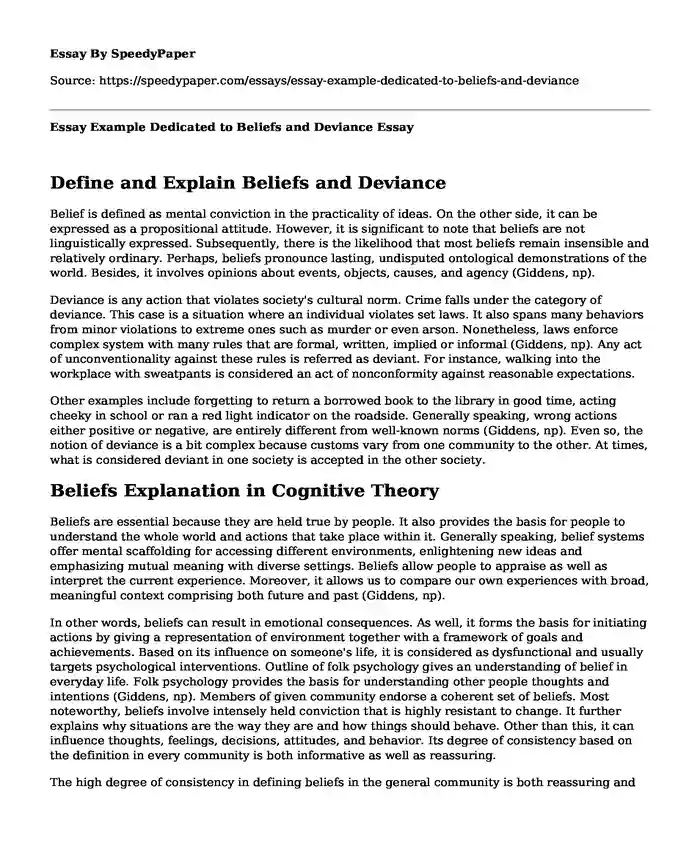Define and Explain Beliefs and Deviance
Belief is defined as mental conviction in the practicality of ideas. On the other side, it can be expressed as a propositional attitude. However, it is significant to note that beliefs are not linguistically expressed. Subsequently, there is the likelihood that most beliefs remain insensible and relatively ordinary. Perhaps, beliefs pronounce lasting, undisputed ontological demonstrations of the world. Besides, it involves opinions about events, objects, causes, and agency (Giddens, np).
Deviance is any action that violates society's cultural norm. Crime falls under the category of deviance. This case is a situation where an individual violates set laws. It also spans many behaviors from minor violations to extreme ones such as murder or even arson. Nonetheless, laws enforce complex system with many rules that are formal, written, implied or informal (Giddens, np). Any act of unconventionality against these rules is referred as deviant. For instance, walking into the workplace with sweatpants is considered an act of nonconformity against reasonable expectations.
Other examples include forgetting to return a borrowed book to the library in good time, acting cheeky in school or ran a red light indicator on the roadside. Generally speaking, wrong actions either positive or negative, are entirely different from well-known norms (Giddens, np). Even so, the notion of deviance is a bit complex because customs vary from one community to the other. At times, what is considered deviant in one society is accepted in the other society.
Beliefs Explanation in Cognitive Theory
Beliefs are essential because they are held true by people. It also provides the basis for people to understand the whole world and actions that take place within it. Generally speaking, belief systems offer mental scaffolding for accessing different environments, enlightening new ideas and emphasizing mutual meaning with diverse settings. Beliefs allow people to appraise as well as interpret the current experience. Moreover, it allows us to compare our own experiences with broad, meaningful context comprising both future and past (Giddens, np).
In other words, beliefs can result in emotional consequences. As well, it forms the basis for initiating actions by giving a representation of environment together with a framework of goals and achievements. Based on its influence on someone's life, it is considered as dysfunctional and usually targets psychological interventions. Outline of folk psychology gives an understanding of belief in everyday life. Folk psychology provides the basis for understanding other people thoughts and intentions (Giddens, np). Members of given community endorse a coherent set of beliefs. Most noteworthy, beliefs involve intensely held conviction that is highly resistant to change. It further explains why situations are the way they are and how things should behave. Other than this, it can influence thoughts, feelings, decisions, attitudes, and behavior. Its degree of consistency based on the definition in every community is both informative as well as reassuring.
The high degree of consistency in defining beliefs in the general community is both reassuring and informative. In contrast to present-day cognitive science such as knowledge, memory and beyond, beliefs apply to both present and future events (Giddens, np). Furthermore, it involves self-referential fundamentals that are not available in modern philosophy. Unlikely, opinions do not make necessary contain the evaluative component.
Theories of Deviance
Emile Durkheim's Deviance Theory
Durkheim claims that deviance is a typical and essential aspect of any society. This reason is that it boosts social orders. In his research, Durkheim identified four significant roles of deviance. To begin with, it helps in verifying cultural values and norms. Witnessing a person punished from deviant acts strengthens what is acceptable or unacceptable by the society. On the other side, sentencing those who break the law upholds culturally held values. Secondly, it clarifies what is wrong or right. Retorts to deviance help the people differentiate right from wrongdoings. For instance, punishing a student who cheats an exam prove to the rest that cheating is wrong. As well, it helps unit people in the community. Consider repercussion of attacks on September 11, 2001, people all over the world come together in their grief. Last but not least, it promotes social advancements (Giddens, np).
Robert Merton's Strain Theory
Robert Merton's strain theory argues that when individuals are prohibited from attaining social goals by institutional means, they undergo strain that results in deviance. As well, they feel they are no longer part of the society. For instance, in a group of graduating high school students, a higher percentage is accepted to join higher learning institutions (Giddens, np). The remaining percent comprises of those who want to continue with education but they cannot as they do not a chance while others do not want to hear about school anymore. However, everyone among the students wants to be stable financially. Likely, those want to join the school, but no given a chance remain frustrated because schooling is the ultimate goal of success. Subsequently, they might respond to such situation by involving themselves in unusual activities.
Work Cited
Giddens, Anthony. Introduction to sociology. WW Norton, 2016.
Cite this page
Essay Example Dedicated to Beliefs and Deviance. (2022, Jun 16). Retrieved from https://speedypaper.net/essays/essay-example-dedicated-to-beliefs-and-deviance
Request Removal
If you are the original author of this essay and no longer wish to have it published on the SpeedyPaper website, please click below to request its removal:
- Essay Example on Genetic Diseases
- New Regulations to Protect the Consumers - Financial Regulation Essay Sample
- Free Essay Sample about Democratization of Germany
- Essay Sample in History: Latin American Revolutions
- Cloud Computing Essay Example
- Free Essay Sample about Hijab
- Essay Example Focusing on Santa Clara County Small Claims Courts
Popular categories





